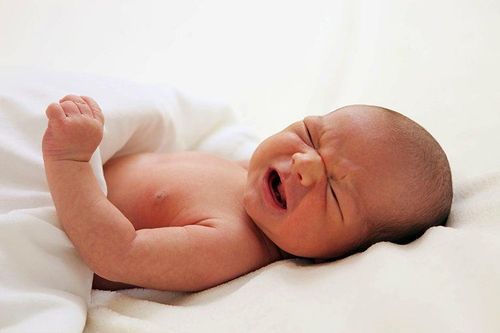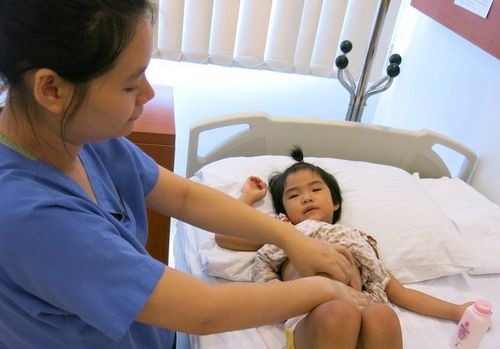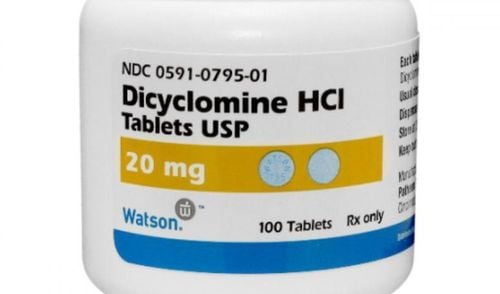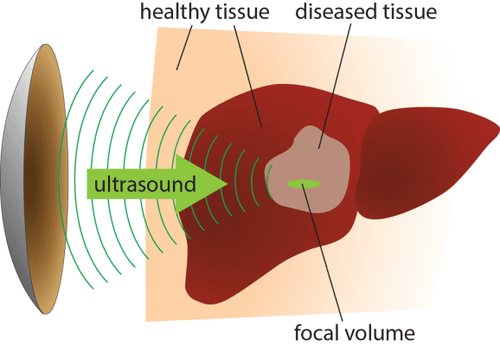This is an automatically translated article.
Enlarged colon in children is a fairly common condition due to many causes. This disease is a cause of persistent constipation in children.
1. What is an enlarged colon?
Aneurysm is an abnormal dilation of the colon that is not caused by a mechanical obstruction. Accompanying this abnormal dilation is a decrease in the normal peristalsis of the intestinal tract. When bowel movements are reduced, stools will slow down and be reabsorbed in the colon, making them much dry and hard, very difficult to excrete. Over time, the stool accumulates more and more, causing the colon to become heavier and heavier.
2. What causes an enlarged colon in children?
Children with hypertrophy have many different causes and risk factors. Sometimes, a specific cause of megacolon is not found in children.
Some common causes of megacolon in children include:
Gastrointestinal infections: This is one of the most common causes. Microbial agents that can lead to disease include bacteria such as Clostridium difficile, Salmonella, Shigella and Campylobacter or parasites such as Trypanosoma cruzi (commonly known as Chagas disease) and Entamoeba histolytica (amoeba dysentery). Congenital megacolon: This condition is also known as Hirschsprung. This is a very rare condition, more common in men than women. Congenital megacolon is caused by a lack of nerve cells in the muscles of the baby's colon, so that when stool is pushed from another part, there is no bowel movement and it causes bowel obstruction. This disease can be seen with a higher rate in children who have a family member with the disease, have other congenital diseases... This is a condition that needs to be detected and treated in time to avoid complications. dangerous symptoms such as colon perforation... Use of certain drugs: In rare cases, the disease can be a side effect of the drug. Most notably, drugs like Risperidone, Clozapine, Loperamide. Some other causes: Other causes can cause such as electrolyte imbalance, hypothyroidism, after a major surgery.
3. Signs of an enlarged colon in children
For cases of congenital colonic aneurysm, you can see the following symptoms right after birth such as: No meconium 24 hours after birth, abdominal distension, vomiting, vomiting greenish-brown fluid, crying, discomfort, defecation. a lot when stimulated. There are mild cases that can manifest as children get older such as frequent constipation, irritability, nausea, mild abdominal distension, accompanied by malnutrition, physical retardation. For older children, the signs may include: abdominal distention, persistent constipation, the child cannot defecate on his own but has to be enema frequently, the stools are black, have a foul smell, and the child is always clear. fatigue, underdevelopment.

Phình đại tràng ở trẻ em thường gây táo bón kéo dài khi trẻ lớn hơn
4. Diagnosing megacolon in children
When the child is exploited, there are abnormal signs that suggest colonic disease. Then it is possible to carry out some more paraclinical measures to help accurately diagnose the disease, as well as whether it is congenital colonic aneurysm or not. Some paraclinical measures such as:
Abdominal X-ray using contrast material: Contrast is introduced into the mammary gland by a special tube. Contrast allows x-rays to show a clear contrast between the enlarged and normal bowel. Measuring muscle control around the rectum: Manometry is commonly performed in older children and adults. Performed by inflating a balloon inside the rectum, the surrounding muscles will usually relax. If it cannot be dilated, it is likely that the child has congenital megacolon. Colon biopsy: Helps to detect if this is congenital megacolon. Because when observing will determine whether there are nerve cells or not.
5. How to treat an enlarged colon in children?
The treatment depends on the condition and extent of the disease, there are appropriate treatment measures.
If the disease is mild: Usually prescribed medication in combination with a scientific diet. Severe ulcerative colitis, especially severe cases of colonic aneurysm in infants, will be indicated for surgical treatment. Colon enlargement in children can have a significant impact on mental and physical development in children if not detected and treated properly. In particular, severe congenital colonic aneurysm can cause many dangerous complications. Therefore, when the child has abnormal symptoms, the child should be taken to a medical facility for examination as soon as possible.
Please dial HOTLINE for more information or register for an appointment HERE. Download MyVinmec app to make appointments faster and to manage your bookings easily.













